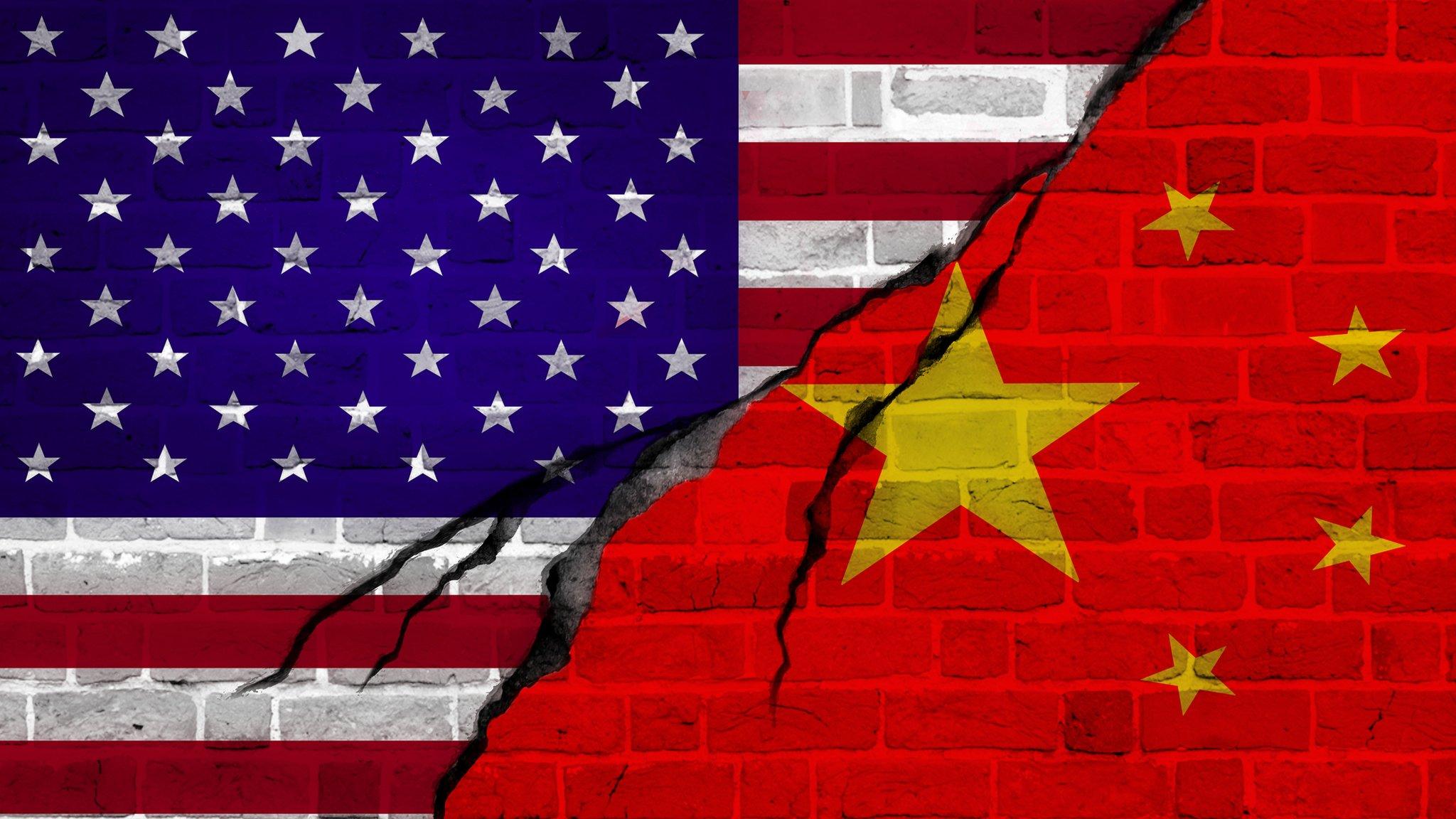Mexico 'won't be provoked by US' over migrant row
- Published
CCTV captures the moment hundreds of migrants cross into the US
Mexico's president has insisted his government will not be provoked, after President Donald Trump announced escalating tariffs on all goods unless Mexico curbed illegal migration.
Andrés Manuel López Obrador described Mr Trump's slogan "America First" as a fallacy and said universal justice was more important than borders.
Stock markets saw sharp losses following Mr Trump's announcement.
Mr Trump declared a national emergency at the US-Mexico border in February.
He said it was necessary in order to tackle what he claimed was a crisis with thousands of undocumented migrants crossing the US southern frontier.
Mr Trump's latest statement came a day after US border authorities in El Paso, Texas, detained a group of more than 1,000 migrants - the largest single group agents had ever encountered.
White House spokeswoman Sarah Sanders said on Friday that Mexico could have done more to stop the group - and others - as they travelled through the country.
"They could have easily broken up this group, arrested them or sent them back home, and they didn't do anything," she told reporters.
"We're asking Mexico to enforce their own laws to help stop the people coming in from Central America."
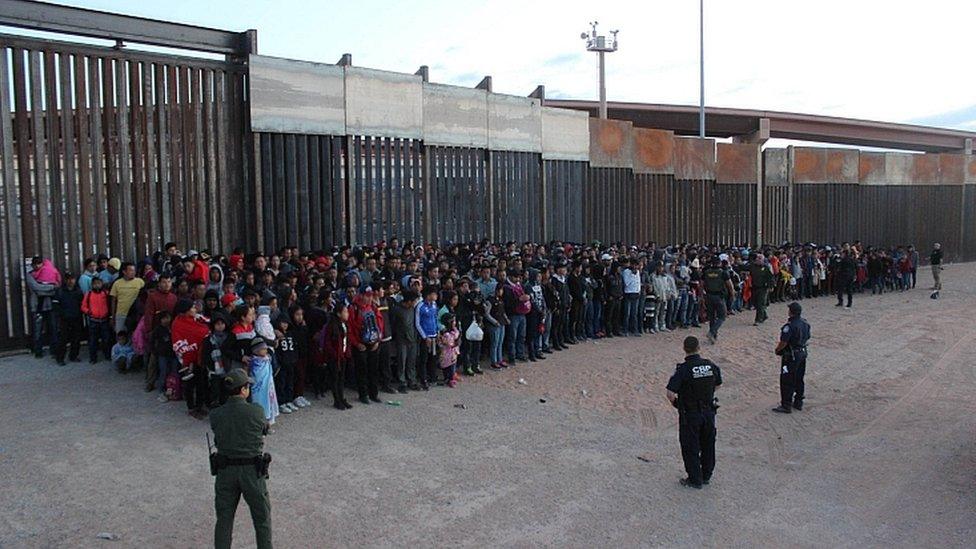
The migrants caught on Wednesday came from Guatemala, Honduras or El Salvador and included entire families, agents said
In tweets later on Friday, President Trump said the tariffs were also to encourage Mexico to "take back" the country from drugs cartels.
Allow X content?
This article contains content provided by X. We ask for your permission before anything is loaded, as they may be using cookies and other technologies. You may want to read X’s cookie policy, external and privacy policy, external before accepting. To view this content choose ‘accept and continue’.
What did Mr López Obrador say?
The president said he had ordered his foreign minister to travel to Washington on Friday.
"I want to insist that we are not going to fall into any provocations, that we are going to act prudently with respect to the authorities of the United States [and] with respect to President Donald Trump," he said.
In a letter to his US counterpart, Mr López Obrador said Mexico was complying with its responsibility to avoid "as far as possible and without violating human rights, the passage [of migrants] through our country".
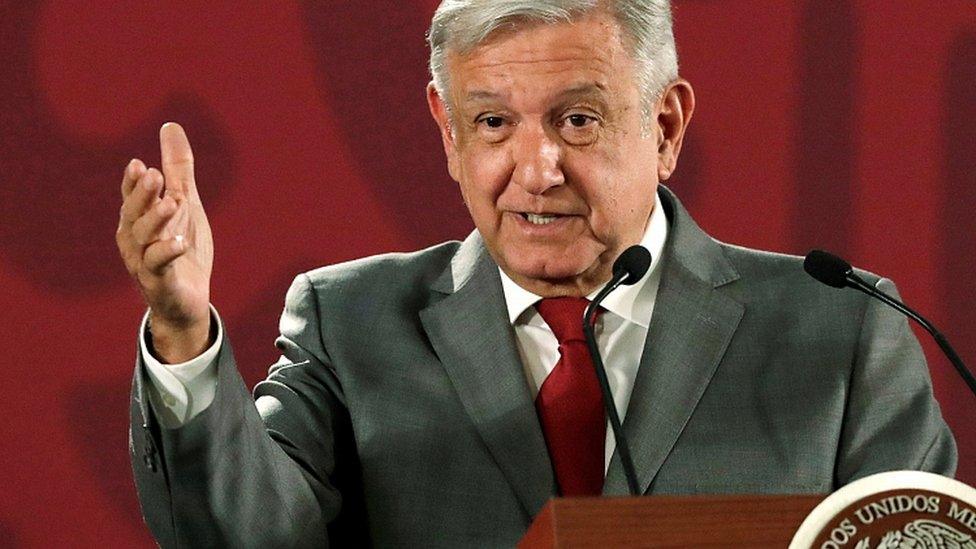
Andrés Manuel López Obrador said social problems could not be resolved with tariffs
"President Trump: Social problems are not resolved with tariffs or coercive measures," he added.
"With all due respect, although you have the sovereign right to express this, the slogan 'United States [America] First' is a fallacy because, until the end of time, and even over and above national frontiers, universal justice and fraternity will prevail."
Foreign Minister Marcelo Ebrard confirmed on Twitter that he would lead a delegation to Washington, adding: "The treatment of Mexico is unfair and does not make economic sense to anyone."
He later tweeted that a summit to resolve the dispute would be held in Washington on Wednesday, with US Secretary of State Mike Pompeo heading the US side.
"We will be firm and defend the dignity of Mexico," he said.
How has US business reacted?
The US Chamber of Commerce, which represents three million businesses in the US, condemned Mr Trump's plan. Chief policy officer Neil Bradley said the tariffs would "be paid by American families and businesses without doing a thing to solve the very real problems at the border".
The Business Roundtable, a US body made of chief executives of major US corporations, said it would be "a grave error" and urged Mr Trump to reconsider.
Five numbers that explain US border crisis
It warned that the move jeopardised the new US-Mexico-Canada trade deal to replace the North American Free Trade Agreement (Nafta).
President Trump's top trade adviser Robert Lighthizer had opposed the plan, the Wall Street Journal reported, external, also warning that the new trade deal could be affected. One source quoted by the paper said: "Lighthizer is not happy."
What did Mr Trump say?
The US president has long accused Mexico of not doing enough to stem the flow of people. Migrants, most of whom say they are fleeing violence in Central American countries, travel through Mexico on their way to the US, where they hope to claim asylum.
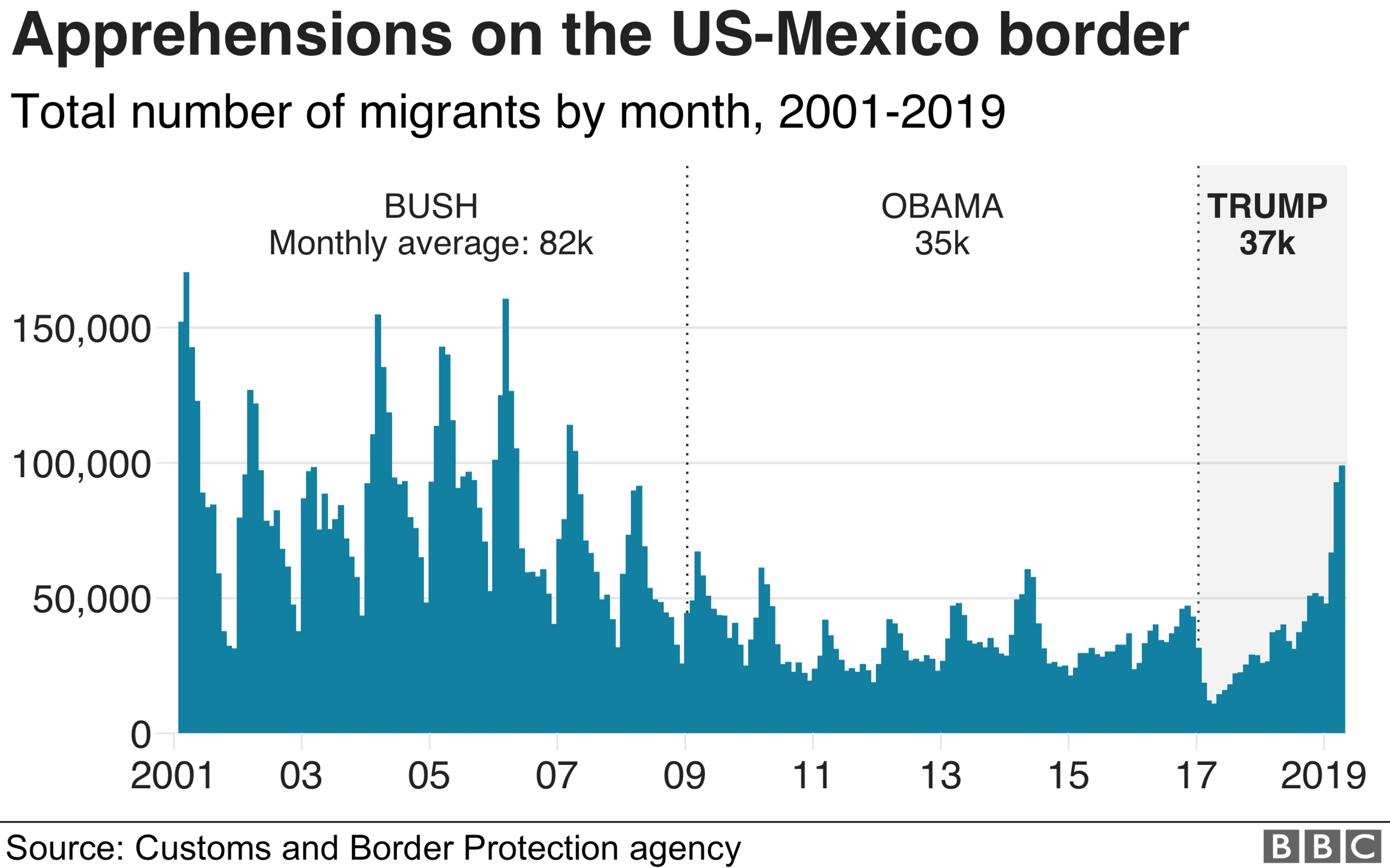
In a White House statement, Mr Trump said the tariffs would rise by five percentage points each month, external until 1 October, when the rate would reach 25%.
The tariffs would stay at that level "unless and until Mexico substantially stops the illegal inflow of aliens coming through its territory", he said.
"For years, Mexico has not treated us fairly - but we are now asserting our rights as a sovereign nation," the statement said.
Allow X content?
This article contains content provided by X. We ask for your permission before anything is loaded, as they may be using cookies and other technologies. You may want to read X’s cookie policy, external and privacy policy, external before accepting. To view this content choose ‘accept and continue’.
The president also took aim at his Democratic opponents, accusing them of a "total dereliction of duty" over border security.
The Democratic-controlled House of Representatives is taking legal action to halt the Trump administration's efforts to build a border wall, saying it would be a waste of funds and would not stop illegal immigration.
What will the tariffs affect?
Mexico was the second largest supplier of goods to the US last year, with imports totalling $352bn (£275bn), according to Goldman Sachs.
It is known for agricultural products like avocados and tequila, but the country is also a major manufacturing hub and home to many US companies.
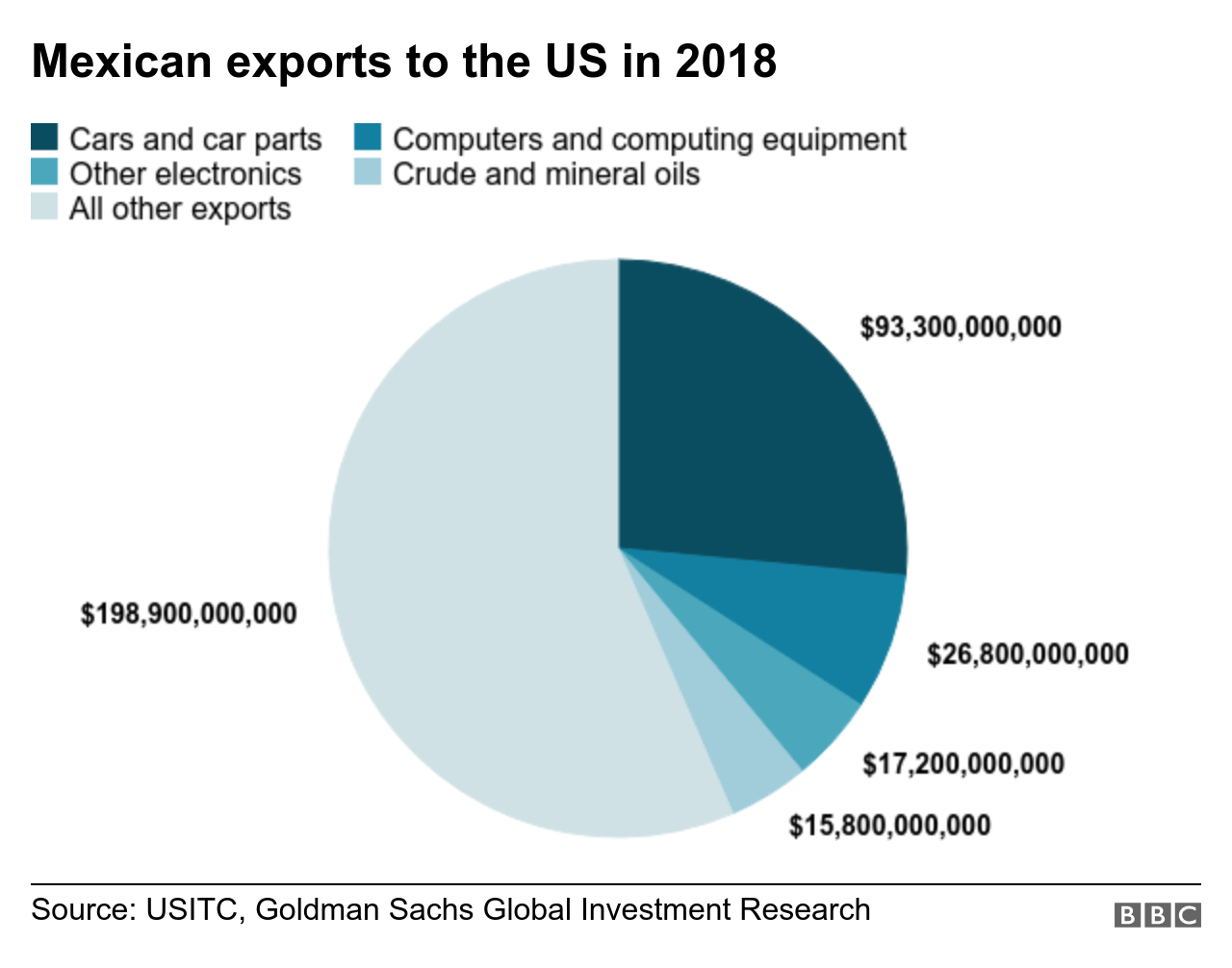

The country produces hundreds of thousands of cars every month, and is also home to technology and aerospace companies. It is one of the G20 economies.
US firms Ford, General Motors, John Deere, IBM and Coca-Cola all operate in Mexico, as well as thousands of other multinationals.
On Friday, the three main US financial markets opened almost 1.5% down, with General Motors falling 5%.
The president's statement comes amid a trade war with China.
After complaining for years about the US trade deficit with China, Mr Trump imposed tariffs on hundreds of billions of dollars worth of goods coming from the country.
- Published25 May 2019
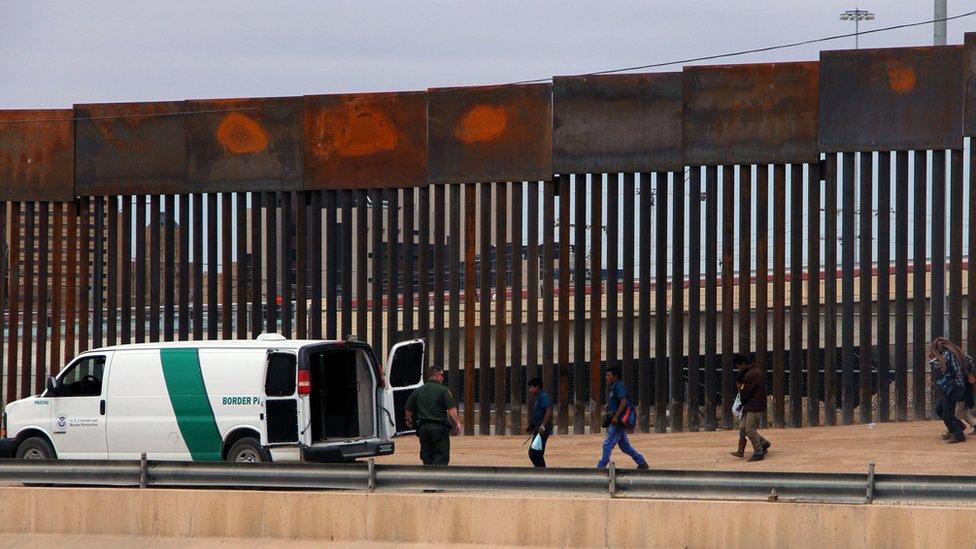
- Published16 January 2020
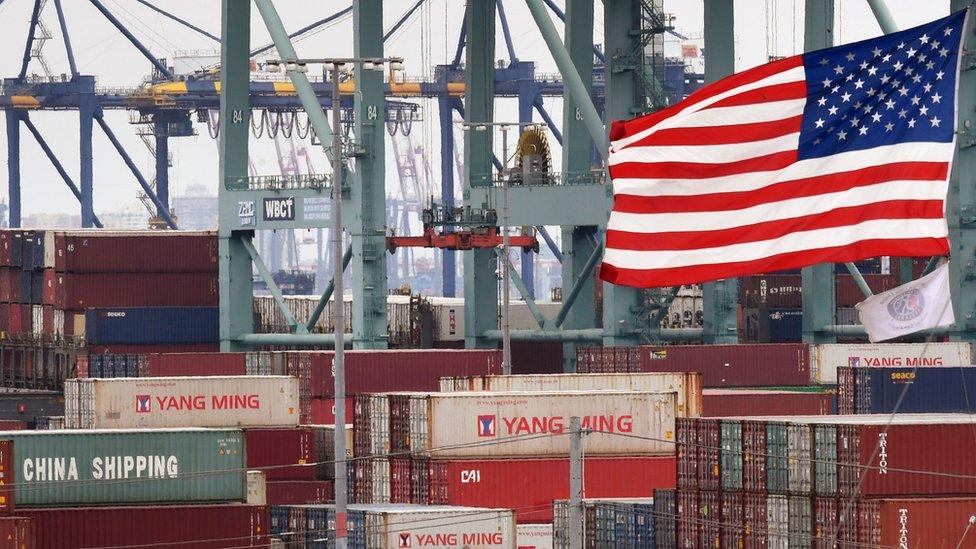
- Published10 May 2019
